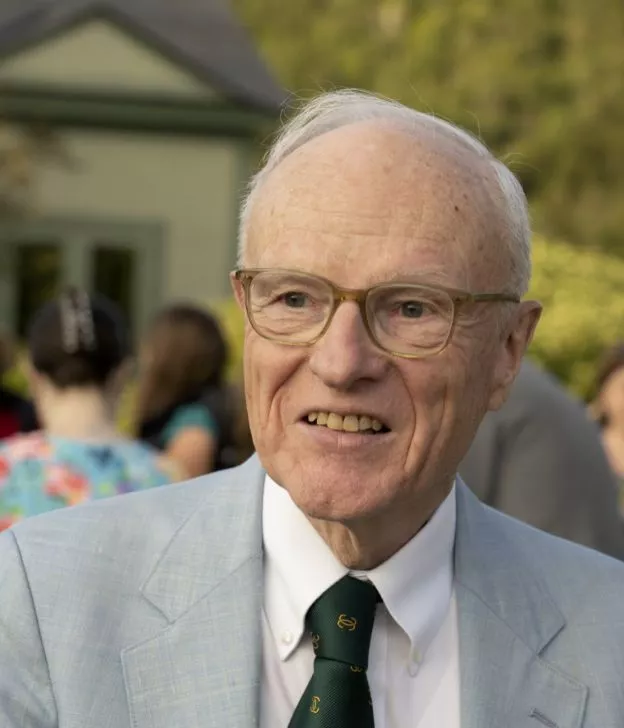
An interview with George Nash
JMC Resident Historian Elliott Drago sat down with JMC Scholar George Nash to discuss conservatism, Herbert Hoover, and the American theme of freedom.
The overarching and galvanizing ideal
ED: What inspired you to become a historian?
GN: I think boyhood and teenage experiences were quite influential in setting me on the path to becoming a historian.
When I was ten years old, my grandfather gave me a ten-volume, pictorial history of World War II. It was fascinating, and it prompted me to borrow a slew of books on the subject from my local public library. Around that time I became an avid collector of postage stamps from many countries—a hobby that stimulated an interest in geography and current world events. I also became politically conscious in that period and highly aware of the Cold War. In the autumn of 1956, I listened raptly to radio reports about the Hungarian revolution that was crushed by the Soviet Union.
In the eighth grade, through a program at my middle school, I became a subscriber to the New York Times. Just before entering high school, I read Arthur Conan Doyle’s Complete Works of Sherlock Holmes. It awakened or imbued in me a lifelong love of detective work, which, when you think about it, is an integral part of what historians do.
History looming
GN: In high school, as a member of the debating team, I was called upon to study and speak about such controversies of the day as federal aid to education and reform of the United Nations. All these topics had a historical dimension. Preparation for debate contests entailed considerable research in sources like the Congressional Record, a task I thoroughly enjoyed. One of my favorite high school courses—U.S. history—was structured around the study of primary sources: a novel approach in the early 1960s. And throughout high school, current events and their historical roots—like the Cuban missile crisis and the civil rights revolution—loomed large in my consciousness.
By the time I entered Amherst College, I knew that I liked to read, write, speak, and conduct research on public affairs and twentieth-century historical subjects. Initially I thought a little about pursuing a career in law or international relations. But very quickly I found that the courses that most inspired me were in history and American studies, and I became a history major. In my senior year, as one of fifteen classmates exempted from all further course requirements, I developed a plan of supervised independent study. It culminated in my writing a lengthy, Master’s-type thesis in history, which yielded two of my first scholarly articles. By the autumn of that year, the next stage in my intellectual journey was obvious: graduate school, followed by a career as a professional historian.
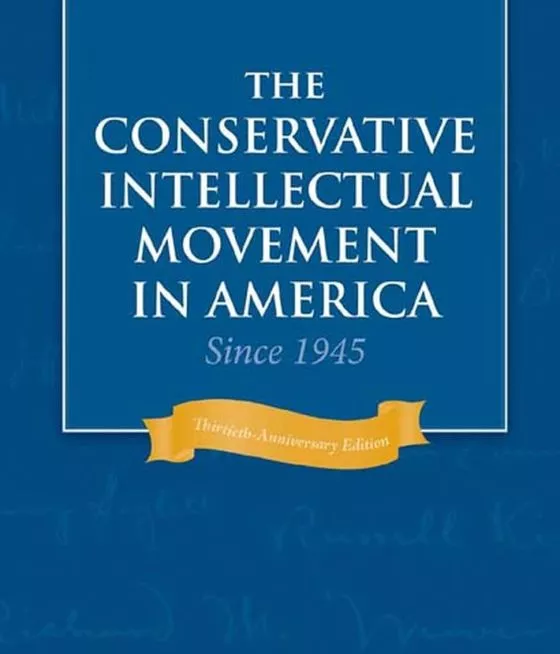
ED: What is your area of specialty, and what sparked your interest?
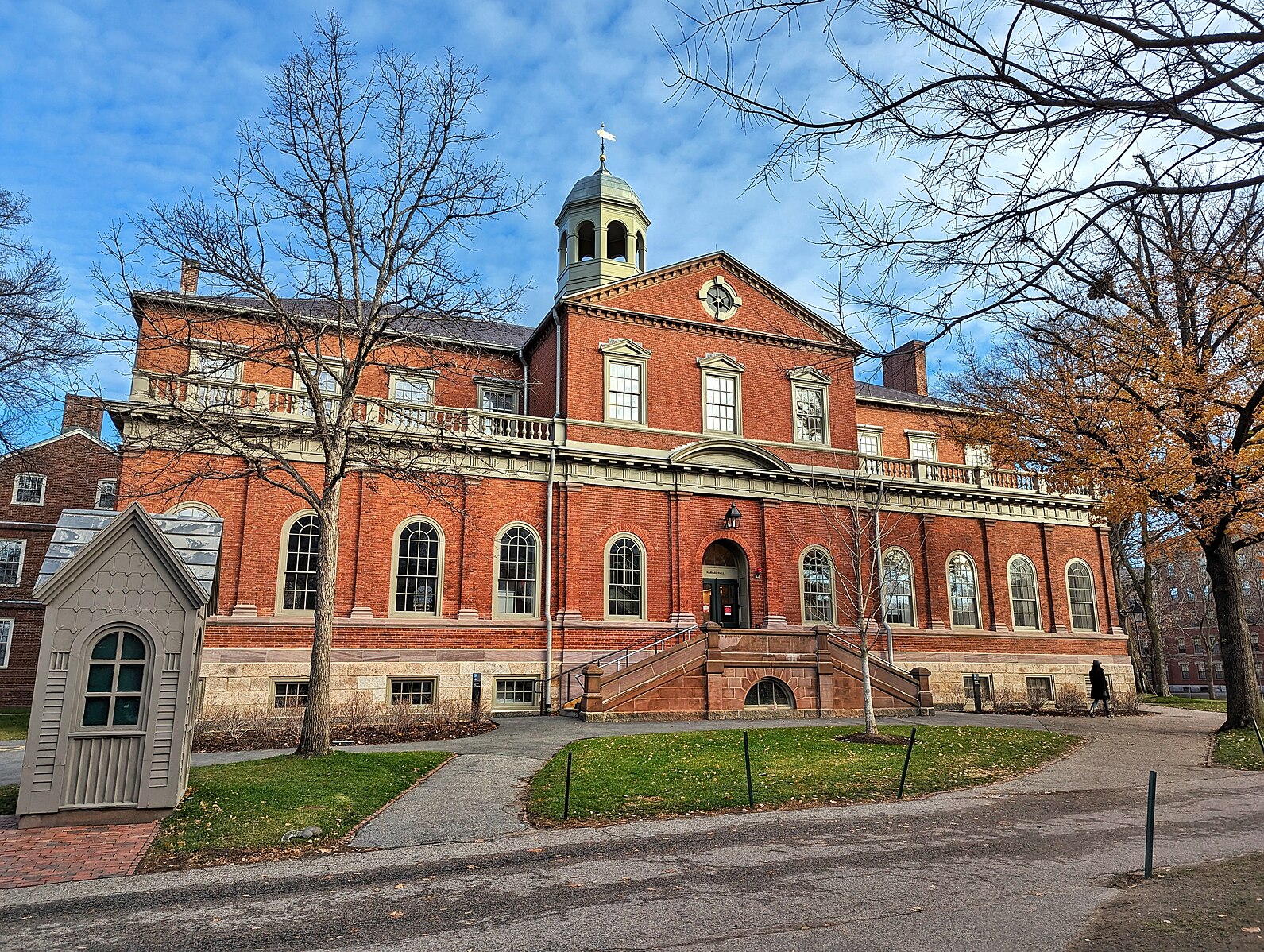
GN: By the time I entered graduate school at Harvard University (right) in the late 1960s, my principal area of interest was American intellectual and political history. At the end of my second year, I asked Professor Donald Fleming (a distinguished intellectual historian) to be my advisor for a dissertation in that field. Casting about for an appropriate topic while living in a politically tense, university environment, I became fascinated by the phenomenon of intellectuals in American politics. At first I considered writing about a “leftwing” topic, such as the pre-World War I muckrakers and Progressives. I remember examining student protest movements in the 1930s. Eventually, at my advisor’s suggestion, I looked at intellectuals on the other side of the political divide: modern American conservatives. There I found an intellectual community in ferment—and one not much studied in a systematic, scholarly way: two attractions for an aspiring historian in search of a dissertation topic.
American intellectual and political history since 1900 remains my primary specialty. But my two principal subjects of study within that field—American conservatism and the life of Herbert Hoover—have obliged me often to conduct research in a variety of other fields: economic theory, political philosophy, the American Founding, Australian mining history, the policies of the Federal Reserve Board, and the history of Communism and anticommunism, to name a few.
Because American conservative intellectuals wrote so much, and because Herbert Hoover did so much, my study of them has been an endlessly stimulating experience.
ED: Explain the thesis of your book The Conservative Intellectual Movement in America Since 1945.
GN: My book—originally my doctoral dissertation—is a study of conservative intellectuals, not politicians or what used to be called the “Radical Right.” My focus is on a “movement” with many points of origin and diverse tendencies: a coalition driven by ideas and an urge to implement them in American public life.
In 1945, at the end of World War II, no articulate, coordinated, self-consciously conservative intellectual force existed in the United States. There were, at most, scattered voices of protest, profoundly pessimistic about the future of the country. Gradually, during the first postwar decade, these voices multiplied, acquired an audience, and began to generate an intellectual community of discourse. In the beginning, there was not one rightwing renascence, but three: classical liberals and libertarians; “new conservatives” and “traditionalists”; and militant anti-Communists (some of whom were ex-radicals). Each had a deep antipathy to twentieth-century American liberalism.
Coalescence and fusion
GN: In the 1950s and early 1960s these three independent wings of the conservative revolt against the Left began to coalesce, particularly under the leadership of William F. Buckley Jr. (left) and his magazine National Review. As they did so, they confronted two recurrent intellectual problems, which my book examines at length. First: what—besides a common foe—held these intellectuals together? What intellectual legitimacy did this emerging coalition possess? What, in short, was conservatism? Second: what was conservatism in America? How should the nascent Right answer criticism from the Left that the United States was really a “liberal” country and that “conservatives” in America were either fringey fanatics unworthy of respect, or “hothouse plants” whose ideas were imported from the Old World and had little relevance here? Out of a protracted and often contentious quest for philosophical coherence and a viable heritage there came a philosophical construct and sensibility known as fusionism, a modus vivendi aided immensely by the third element in the evolving coalition: Cold War anticommunism, an ideology nearly everyone could share.
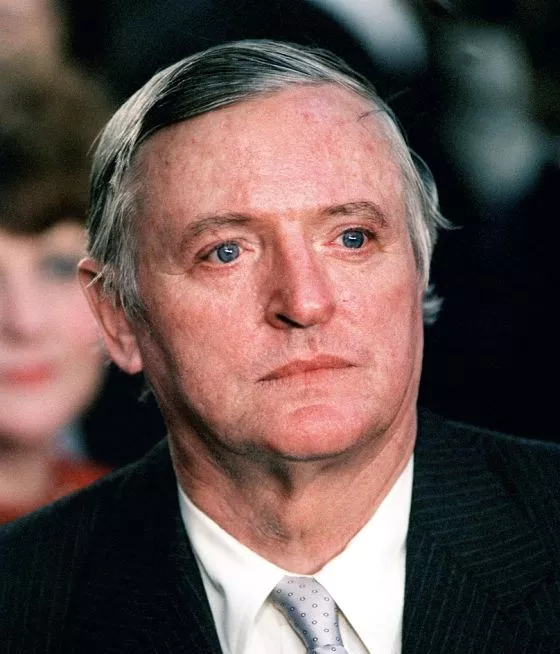
GN: As I explain in my book, the 1960s and 1970s were years of preparation for American conservatives—a time of transition from minority to potentially majority status in American politics and culture. During this period conservative intellectuals produced sophisticated critiques of liberal domestic and foreign policies and started to build an impressive network of foundations, think tanks, periodicals, public interest law firms, and other manifestations of applied conservatism: the first steps in a passage from the world of theory to the world of political influence.
The first edition of my book was published in 1976, as the conservative intellectual movement was entering the American mainstream. In later, amplified editions (1996 and 2006) I surveyed newer developments, notably the phenomenon of neoconservatism and the rise of the “religious Right” (the latter a conservative ecumenical movement without precedent in American religious history). I also emphasized the continuing growth of the conservative counterculture.
By the early twenty-first century a once marginalized minority had achieved remarkable prominence and considerable power to affect the future of American politics.
ED: The demise of the Soviet Union might seem like ancient history to some readers, especially high school or college-aged students. To what extent does that demise still motivate or inform how American conservatives understand their own political beliefs?
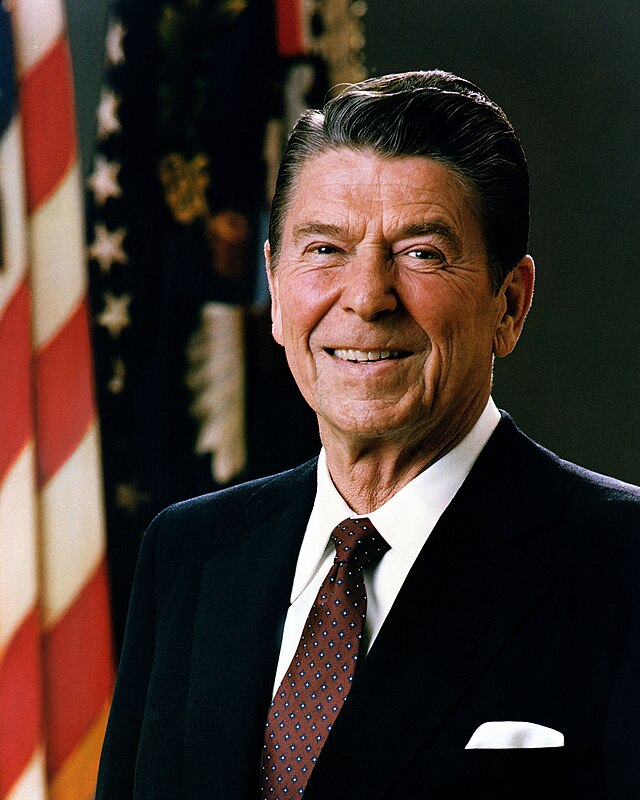
GN: I once heard a scholar remark that the trouble with historians of the New Deal is either that they lived through it—or that they did not! One might say today that you can tell much about a conservative’s worldview if you know whether he or she lived through the Cold War or not.
As mentioned earlier, the conservative movement that took form after World War II was profoundly shaped by anti-communism and by the struggle against what Ronald Reagan called the “evil empire” headquartered in Moscow. The life-and-death stakes of the Cold War brought many on the intellectual Right together, despite frequent differences of varying intensity on other subjects.
With the fall of the Berlin Wall in 1989 and the demise of the Soviet Union two years later, a question inevitably arose: could a movement so identified with anticommunism survive the disappearance of the Communist adversary in the Kremlin? Without a common foe upon whom to concentrate their minds, it soon became easier for former allies on the Right to splinter off, pursue their own agendas, and succumb to the bane of all coalitions: the sectarian temptation.
The conservative intellectual movement, of course, did not disappear in the 1990s. Nor, we should note, did such Communist states as China and Cuba. In that respect, the Cold War never fully left us.
GN: Nevertheless, it is undeniable that anti-communism supplied much of the glue that sustained the post-1945 conservative coalition and that the end of the Cold War in Europe weakened the fusionist imperative for American conservatives.
Since 1991 one of the hallmarks of conservative intellectual history has been the quest for new sources of unity—a new fusionism, as it were, for a new era. Thus in recent decades, we have heard about “leave us alone” conservatism, “national greatness” conservatism, “compassionate” conservatism, “reform” conservatism, “crunchy” conservatism, and “tea party” conservatism, among other formulations of what conservatives should stand for in a new age. This process has accelerated since 2016, when Donald Trump and his “America First” supporters assailed not only the liberal establishment and the Republican Party establishment but also the separate and distinct conservative establishment rooted in the Buckley/Reagan/Cold War era.
Today the conservative community in America—a community built on ideas—has become a house divided over ideas, including the ideational foundations of American foreign policy. Those on the Right who recall the Cold War years and who adhere to Reaganite, conservative internationalism frequently find themselves at odds now with those who have a “nationalist” worldview and a post-Cold War (or pre-Cold War) aversion to military intervention in faraway places. I do not know how these tensions on the Right, which are partly generational, can be resolved intellectually. It may be that world events— a new Cold War, perhaps—will soon clarify conservative foreign policy thinking.
ED: Most Americans would be hard-pressed to admit that they know anything about Herbert Hoover—other than his eponymous dam. Why should more Americans know about Herbert Hoover, and what should they know about him?
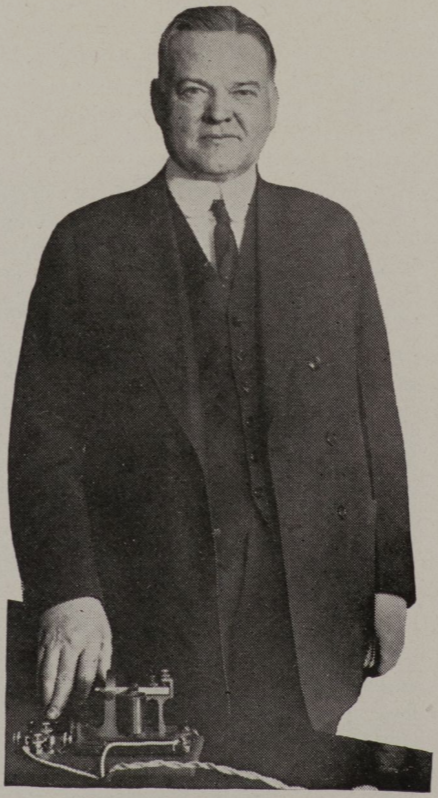
GN: In 1964 Herbert Hoover died at the age of ninety. He had lived a phenomenally productive life, including more than half a century in one form or another of public service. It was a record that in sheer scope and duration may be without parallel in American history.
Born in Iowa in 1874 as a son of the village blacksmith, Hoover was orphaned before he was ten. By 1914 he was an internationally acclaimed and extraordinarily successful mining engineer who had traveled around the world several times. After World War I commenced that summer, Hoover, residing in London at the time, founded and directed a relief commission that provided desperately needed food supplies to more than 9,000,000 Belgian and French civilians caught between a German army of occupation and a British naval blockade. His ad hoc, emergency relief operation quickly evolved into a gigantic humanitarian enterprise without precedent in world history. It continued until the end of the war. By 1917 he was an international hero.
GN: After America declared war on Germany in 1917, President Wilson appointed Hoover head of the United States Food Administration, a special wartime agency. At the conflict’s end, Wilson dispatched him to Europe to organize food distribution to a continent careening toward disaster. For ten grueling months, he directed American-led efforts that combated famine and disease, established stable postwar economies in many countries, and in the process checked the advance of the Bolshevik revolution from the East.
Between 1921 and 1923 Hoover’s American Relief Administration administered a massive, emergency relief operation in Soviet Russia where a catastrophic famine—Europe’s worst since the Middle Ages—had broken out. At its peak of operations, his organization fed upwards of 10,000,000 Russian citizens a day.
All in all, between 1914 and 1923 Hoover directed, financed, or assisted a multitude of international relief endeavors without parallel in the history of humankind. Tens of millions of people owed their lives to his exertions. It was later said of him that he was responsible for saving more lives than any other person in history.
During the 1920s, as secretary of commerce under Presidents Harding and Coolidge, Hoover became one of the three or four most influential men in the U.S. government. Acclaimed as the “Great Humanitarian” and “Master of Emergencies,” he was elected President of the United States in 1928 in a landslide—and without ever having held an elective public office.
Then came the Crash of 1929 and the ensuing Great Depression. During his tormented presidency, Hoover strained without stint to return his country to prosperity, which safeguarding its political moorings. His Sisyphean labors—even now misunderstood—seemed unavailing.
Contrasting old and new worlds
GN: Rejected overwhelmingly at the polls in 1932, Hoover did not fade quietly away. He perceived in the New Deal of Franklin Roosevelt a revolutionary and dangerous transformation of America’s political economy and constitutional order. For the rest of his life Hoover tirelessly conducted what he called a “crusade against collectivism,” in particular against the New Deal. As the Republican Party’s intellectual leader and Roosevelt’s most formidable critic from the Right, he contributed greatly to the critique of ever-aggrandizing statism, a critique that is now integral to American conservatism. It was one of his most enduring legacies.
Finally, more than any American who has held the presidency, Hoover was profoundly acquainted with the social systems of the Old World, where he had lived for long periods as an engineer and humanitarian. His perception of contrast between the Old Word and the New was the experiential core of his social philosophy. It made him into an eloquent exponent of what we have come to call American Exceptionalism. He was both an embodiment and defender of a formative ideal in American history: equality of opportunity and upward mobility. His two books of political philosophy—American Individualism (1922) and The Challenge to Liberty (1934)—remain worth reading today.
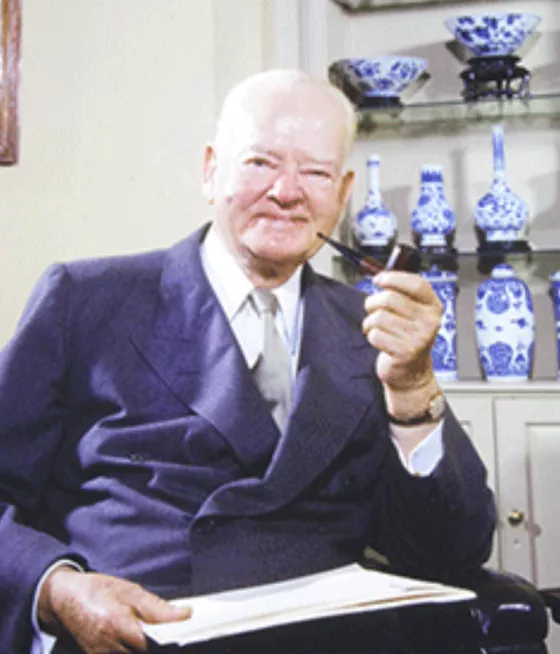
ED: How is writing a biography different from writing a scholarly monograph (a detailed written study of a single subject)?
GN: In theory, writing a biography should be easier: your subject is usually a single person. But people are multifaceted. Their ancestry, upbringing, siblings, spouses, friends, enemies, teachers, heroes, idiosyncrasies, aspirations, achievements, failures, health, humor, hobbies, and spirituality: are all aspects of life that a biographer must explore if the goal is a perceptive and comprehensive understanding of one’s subject.
A monograph, by contrast, is usually focused, not on a single personality, but on a theme or event that the author chooses. A monograph’s intended audience, usually, is scholars and specialists, not general readers. The selected theme or event may involve a personality but not the whole man or woman. In the case of Herbert Hoover, for example, monographs have been written about his policies as President toward Latin America, his response to the Bonus March of 1932, and many other subjects. These are insightful and welcome additions to the scholarly literature, but they are not, and do not aspire to be, complete biographies.
It is possible, of course, to write biographies that can tend to become monographic—intellectual biographies, especially. But understanding a person, and investigating a theme or episode in that person’s life, are not identical projects.
Another distinction, I think, is that biographies are frequently judged by how much they entertain their readers. Monographs do not often have that objective. Now as a historian, I happen to like well-wrought monographs and derive pleasure (as well as information) from them. Monographs may not be for everyone, but a focused work of exemplary scholarship can be a thing of beauty.
ED: What is your favorite Herbert Hoover quotation and why?
GN: In an autobiographical fragment written sometime after World War I, Hoover declared:
“There is little importance to men’s lives except the accomplishment they leave to posterity. What a man accomplishes is of many categories and of many points of view; moral influence, example, leadership in thought and imagination are difficult to measure, to prove, or to treasure. In all these fields men may contribute as well as lead and even in leadership the proportion of success to be attributed to their effort is always indeterminate. In the organization or administration of tangible institutions or constructed works men’s parts can be more certainly defined. When all is said and done, accomplishment is all that counts.”
This is one of the most revealing statements that Herbert Hoover ever wrote. His was a philosophy of life that exalted practical achievement and benefaction. During his long life he created and led many “tangible institutions,” including the Commission for Relief in Belgium and American Relief Administration, which saved many millions of lives. In 1919 he established at Stanford University what became a world-famous archive and think tank: the Hoover Institution on War, Revolution and Peace. He later called it “probably my major contribution to American life.”
Hoover was an amazingly prodigious worker. He was also an extraordinarily prolific writer. Between the ages of 85 and 90 he published seven books! Even in adversity, as a former President, he persevered. Like Winston Churchill in his wilderness years, Hoover never gave in—never. The quotation above helps us to understand why.
ED: What has your research taught you about America’s founding principles and history?
GN: It has been said that “when you become a teacher, by your pupils you’ll be taught.” When I began to study American conservative intellectuals since 1945, I was inevitably drawn into considerable reading about America’s founding principles and history. I did so because my subjects did so. To understand them, I needed to become familiar with their mental world.
What did it mean to be conservative in America?
GN: As I mentioned above, many conservative intellectuals after World War II repeatedly asked themselves: what did it mean to be conservative in America? What exactly, in American civilization did they wish to conserve? This quickly led many of them to turn to the American past for guidance, and particularly to the era of the American Revolution and early American republic. Often these conservative intellectuals disagreed with one another about interpretations of this period, about which Founders (or principles) to extol, and how best to interpret and defend the Constitution. Debates ensued—and some of them persist to this day. In part from exposure to these investigations, polemics, and the scholarly literature that emerged, I acquired an enduring interest in the American Revolution, the writing of the Constitution, and Supreme Court decisions as a branch of American intellectual history. One product of this immersion was my little volume Books and the Founding Fathers, in which I examined the role of books and libraries in the intellectual formation of the extraordinary leaders who created a regime of ordered liberty unique on all history.
As a result of all this reading over the years, I developed great respect for the Founders, whose devotion to liberty and learning changed the world for the better and earned them the gratitude of posterity that they sought.
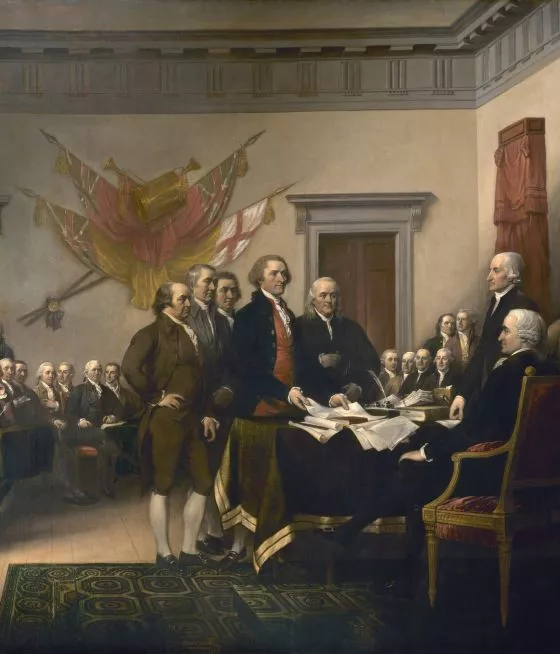
GN: Similarly with Herbert Hoover, a man who not only built a career rich in accomplishment but who also reflected on the circumstances that made such a career possible. He developed a political and social philosophy that attempted to explain the greatness and uniqueness of the country he loved. He called his philosophy “American individualism.” Reading Hoover’s writings on this subject has given me a deeper appreciation of the distinctiveness of America as a free, dynamic, aspirational society, grounded, in his words, on the ideal of equality of opportunity and “the negation of class.”
ED: What’s one thing that you wish that every student should know about American history?
GN: Herbert Hoover once wrote that “the most potent force in society is its ideals.” Whatever details that students may absorb about American history, they should learn its overarching and galvanizing ideal. To borrow the title of separate books by John Dos Passos and M. Stanton Evans: “The theme is freedom.”
“America is freedom,” Ronald Reagan declared in his Farewell Address, and it comes in many forms: religious freedom, political freedom, freedom to speak, to write, to think, to travel, and to pursue one’s dreams without requiring permission from a monarch, an oligarch, a despot, or a lawless, totalitarian state.
To be sure, the ideal of freedom has often fallen short of fulfillment during our nation’s history. The terrible blight of slavery and other injustices are stern reminders of past transgressions. Yet the ideal of liberty that has molded our national character and institutions continues to inspire us to do better.
GN: Students should not lose sight of this, especially today when the temptation in many quarters is overwhelming to disparage and even denigrate America’s remarkable history and achievements.
I hope that students of American history will resist the thrill of shallow judgmentalism, condemning America’s past without studying it contextually and in-depth. History is complicated. Beware of sound-bite certitudes and sloganeering. And remember: in the long arc of American history, the theme is freedom.
ED: Thank you for your insights and time!
Elliott Drago serves as the JMC’s Resident Historian and Editorial Manager. He is a historian of American history and the author of Street Diplomacy: The Politics of Slavery and Freedom in Philadelphia, 1820-1850 (Johns-Hopkins University Press, 2022).
